Another edition of JerseyCTF, organized by NJIT. It is my third year of participating in this CTF and it was as much fun as the other years.
Interestingly, there were a number of challenges that were in crossover categories - i.e, combinations of OSINT, Misc and Forensics techniques were used in the same challenge. So, it brought some amount of novelty to the CTF. I participated as part of the team Weak But Leet. We scored 12467 points and were placed 11th overall.
Here are some of the challenges I solved and how I approached them. I came close to solving a couple more.
Miscellaneous
Data-Divergence-Discovery
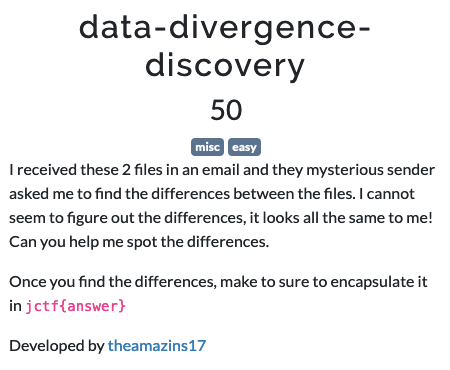
$ git diff --no-index --word-diff=porcelain --word-diff-regex=. neon-echoes-1.txt neon-echoes-2.txt | grep "^+" | grep -v ".txt" | tr -d '+\n'
qu4ntum_c1ph3r5
# My original solution
$ fold -w1 neon-echoes-1.txt > n1.txt
$ fold -w1 neon-echoes-2.txt > n2.txt
# Get either changed or deleted character from the first file and assemble them to get the flag
$ diff n1.txt n2.txt | grep ">" | tr -d "> \n"
qu4ntum_c1ph3r5
the-droid-youre-looking-for
We are given an APK file. There are a number of decompilers that can unpack the .apk file and decompile the class files to java source.
- Decompile and extract the source and configuration files of the APK
- Search for the string
jctf, which will find the match inresources/res/layout/activity_main.xml - Learn that it is the text label with the tag
android:text - Extract all text labels in the file. Assemble to get the flag.
% grep -Eo 'android:text=\".*?\"' activity_main.xml
android:text="jctf{"
android:text="c4n_y0u_s33_m3?"
android:text="}"
android:text="Get Flag"
p1ng-p0ng
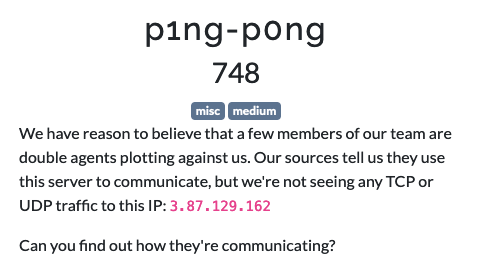
A simple challenge, but a lot of cool things to learn here.
- Given the challenge title, using a simple
pingcommand gives us a seemingly malformed packet, that has an error message in the response.
$ ping 3.87.129.162
PING 3.87.129.162 (3.87.129.162): 56 data bytes
38 bytes from 3.87.129.162: icmp_seq=0 ttl=55 time=479333613884.272 ms
wrong total length 58 instead of 84
wrong data byte #8 should be 0x8 but was 0x63
cp:
49 6e 76 61 6c 69 64 20 63 6f 6d 6d 61 6e 64 2e
20 54 72 79 20 22 28 48 45 4c 50 29 22 2e 0 0 <<--- Invalid command. Try "(HELP)".
0 0 0 0 0 0 0 0 0 0 0 0 0 0 0 0
0 0 0 0 0 0 0 0
dp:
66 0 8a 69 0 0 ab b4 8 9 a b c d e f
10 11 12 13 14 15 16 17 18 19 1a 1b 1c 1d 1e 1f
20 21 22 23 24 25 26 27 28 29 2a 2b 2c 2d 2e 2f
30 31 32 33 34 35 36 37
- So, it is apparent that we need to construct a custom data packet and send it over ICMP.
- Looking into this, I learnt about
npingthat is part of thenmapsuite, which allows us to control the data to be sent over ICMP. - Using the
(HELP)command shows that there are valid commands to add, get the count and retrieve the entries from the server through ICMP.
$ sudo nping --icmp -c1 -v3 --data-string "(HELP)" 3.87.129.162
Starting Nping 0.7.94 ( https://nmap.org/nping ) at 2024-03-24 16:25 EDT
SENT (0.0071s) ICMP [192.168.1.225 > 3.87.129.162 Echo request (type=8/code=0) id=37623 seq=1] IP [ver=4 ihl=5 tos=0x00 iplen=34 id=49455 foff=0 ttl=64 proto=1 csum=0x7229]
0000 45 00 00 22 c1 2f 00 00 40 01 72 29 c0 a8 01 e1 E.."./..@.r)....
0010 03 57 81 a2 08 00 a7 49 92 f7 00 01 28 48 45 4c .W.....I....(HEL
0020 50 29 P)
RCVD (0.5894s) ICMP [3.87.129.162 > 192.168.1.225 Echo reply (type=0/code=0) id=37623 seq=1] IP [ver=4 ihl=5 tos=0x00 iplen=144 id=63958 flg=D foff=0 ttl=55 proto=1 csum=0x0214]
0000 45 00 00 90 f9 d6 40 00 37 01 02 14 03 57 81 a2 E.....@.7....W..
0010 c0 a8 01 e1 00 00 6c 63 92 f7 00 01 43 6f 6e 6e ......lc....Conn
0020 65 63 74 69 6f 6e 20 73 75 63 63 65 73 73 66 75 ection.successfu
0030 6c 2e 20 41 76 61 69 6c 61 62 6c 65 20 63 6f 6d l..Available.com
0040 6d 61 6e 64 73 3a 20 22 28 48 45 4c 50 29 22 2c mands:."(HELP)",
0050 20 22 28 47 45 54 3b 49 44 3b 45 4e 54 52 59 5f ."(GET;ID;ENTRY_
0060 4e 55 4d 29 22 2c 20 22 28 41 44 44 3b 49 44 3b NUM)",."(ADD;ID;
0070 45 4e 54 52 59 5f 43 4f 4e 54 45 4e 54 29 22 2c ENTRY_CONTENT)",
0080 20 22 28 45 4e 54 52 59 5f 43 4f 55 4e 54 29 22 ."(ENTRY_COUNT)"
- After some trial and error, we can see that the command
(GET;;1)returns the first message from the server. - Iterating over the list of messages gives us the fragments of messages that can be assembled into the flag.
| Command | Response |
|---|---|
| (HELP) | Available commands: “(HELP)”, “(GET;ID;ENTRY_NUM)”, “(ADD;ID;ENTRY_CONTENT)”, “(ENTRY_COUNT)” |
| (ENTRY_COUNT) | # of Entries: 8 |
| (GET;;1) | USE ICMP FOR COMMS -TL |
| (GET;;2) | PLS SEND FLAG -TL |
| (GET;;3) | SENDING NOW -RB |
| (GET;;4) | jctf{ |
| (GET;;5) | 1L0V3 |
| (GET;;6) | 1CMP7UNN3L1NG |
| (GET;;7) | } |
| (GET;;8) | THX -TL |
Assembling entries 4,5,6 and 7 provides the flag.
wi-will-wi-will…

- We are given a packet capture file.
- Use
pcap2john.pyto generate the hash from the pcap file. - Use
johnandrockyouwordlist to find the WPA password for the SSIDbletchley_park, which isWinstonChurchill - Add the password to Wireshark.
File -> Preferences -> Protocols -> IEEE 802.11 -> Decryption keys - Now, if we do the protocol_statics_hierarchy, we can see we have some TCP/HTTP traffic in the decrypted data
- Use the
export_objectfeature to extract theflag.zipfile. - Use JTR and the
rockyou.txtwordlist (hint from the challenge title) to crack the hash and find the password.
% john --wordlist=~/ctf/tools/wordlists/rockyou.txt we_will_flag.zip.hash
Using default input encoding: UTF-8
Loaded 1 password hash (PKZIP [32/64])
Press 'q' or Ctrl-C to abort, almost any other key for status
zipideedoodah (we_will_flag.zip/flag.txt)
# Use this password to extract the text file from the zip
% unzip -P zipideedoodah -c we_will_flag.zip
Archive: we_will_flag.zip
extracting: flag.txt
jctf{p4ck3t_c4ptur3_ftw}
Forensics
locked out

- We are given a password-protected zip file
- The zip file seems to contain an image file and an SVG document
- Exploring the details of zip, we can see that is using a old zip library, which is also confirmed by the challenge statement.
- From prior experience the
bkcrackutility can crack the password, provided we know atleast 12 contiguous bytes of plain text that is in the zip file contents. - We know that the SVG file is an XML file with the header
<svg version="1.1" - Those 18 bytes are sufficient to break the encryption on this zip file.
$ unzip -l locked-out.zip
Archive: locked-out.zip
Length Date Time Name
--------- ---------- ----- ----
10528 02-19-2024 18:19 flag.png
163138 02-19-2024 19:34 nokeynoprob.svg
--------- -------
173666 2 files
$ echo -n '<svg version="1.1"' | xxd -p
3c7376672076657273696f6e3d22312e3122
$ bkcrack -x 0 3c7376672076657273696f6e3d22312e3122 -C locked-out.zip -c nokeynoprob.svg
[16:40:00] Z reduction using 11 bytes of known plaintext
100.0 % (11 / 11)
[16:40:00] Attack on 575505 Z values at index 6
Keys: 9c9d83e5 7915abee 58998fbc
99.4 % (571963 / 575505)
[16:48:08] Keys
9c9d83e5 7915abee 58998fbc
# Use the keys to decrypt the zip file
$ bkcrack -k 9c9d83e5 7915abee 58998fbc -C locked-out.zip -c flag.png -d locked_flag.png
[17:09:32] Writing deciphered data locked_flag.png (maybe compressed)

secret tunnels

- Using protocol hierarchy statistics of Wireshark, we can see that there are a number of DNS queries and responses.
- Extract only the A records of the hostnames in the
jerseyctf.comdomain. - Assembling the unique hostnames in order and decoding it with Base64 gives us a password protected zip file, which has a file named
flag.txt - Running
Johnagainst the zip file with therockyouwordlist, quickly yields the password asnjit1220
% tshark -r secret-tunnels.pcapng -Y "dns" | grep -Eo "A (.*?)\.jerseyctf.com" | uniq | cut -d. -f1 | sed -e 's/^A //g' | base64 -d > st.zip
% unzip -P njit1220 -c st.zip
Archive: st.zip
extracting: flag.txt
jctf{dn57unn3l1n6}
vibrations

- Use the protocol statistics to determine that the bulk of the traffic is
modbus - There are several devices. Trial and error determines that the device with IP
10.0.2.7is the one of interest. - The TCP payload shows the following structure:
000400000006000600[03]00[66] - We are interested in the third byte from the end, which is the position and the last byte, which contains the data value.
- We also see that some times, the data value is
01and a second message with the same position contains the actual data value. - Use the powerful string utilities in bash to extract the payload, sort it in the right order and convert to ascii values.
- It can be done in a single bash command pipeline as shown here:
% tshark -r final.pcapng -Y "modbus && ip.src==10.0.2.7" -T fields -e "tcp.payload" | cut -c19- | sort | grep -Ev "01$" | cut -c 5- | xxd -r -p
jctf{I_rEllAy_H0p3_thi$_i$nt_a_p0ol_sy$t3m_aGa1n}
digital-footprint

- We are given a packet capture
digitalfootprint.pcapng - We see that there are some files being uploaded using HTTP forms in this traffic.
- We can export all the objects using the handy
--export-objectfeature of Wireshark
% tshark -r digitalfootprint.pcapng --export-object "http,export_path"
% echo "jctf{" | base64
amN0Zgo=
% cd export_path; grep "amN0Z" *
upload(14):EwAACxMBAJqcGAAAADNQTFRFamN0ZntzdDBtcGluZ180cjB1bmRfMW5fdGgzX211ZF80bDNhdmlu
% cat upload\(14\)
------WebKitFormBoundaryiwc7R5HapjiHMEOs
Content-Disposition: form-data; name="file"; filename="this4u.txt"
Content-Type: text/plain
iVBORw0KGgoAAAANSUhEUgAAA1IAAAAyCAMAAABh5BryAAAAAXNSR0IB2cksfwAAAAlwSFlzAAAL
EwAACxMBAJqcGAAAADNQTFRFamN0ZntzdDBtcGluZ180cjB1bmRfMW5fdGgzX211ZF80bDNhdmlu
Z190cjRjM3N9////wtvc2wAAAQpJREFUeJzt07EBgkAAwEBABQHF339aZ0hDddkgxU1Tbs4tuUfu
mXvl1tyWe+f23JGr32fuk/vmrtwvN0YXhRRSSCGFFFJIIYUUUkghhRRSSCGFFFJIIYUUUkghhRRS
SCGFFFJIIYUUUkghhRRSSCGFFFJIIYUUUkghhRRSSCGFFFJIIYUUUkghhRRSSCGFFFJIIYUUUkgh
hRRSSCGFFFJIIYUUUkghhRRSSCGFFFJIIYUUUkghhRRSSCGFFFJIIYUUUkghhRRSSCGFFFJIIYUU
UkghhRRSSCGFFFJIIYUUUkghhRRSSCGFFFJIIYUUUkghhRRSSCGFFFJIIYUUUkghhRRSSCGF1M2k
/h7v0p1YDHnwAAAAAElFTkSuQmCC
------WebKitFormBoundaryiwc7R5HapjiHMEOs--
# Extract the B64 text and decode it
% grep -A8 "iVB" upload\(14\) | base64 -d | xxd
00000000: 8950 4e47 0d0a 1a0a 0000 000d 4948 4452 .PNG........IHDR
00000010: 0000 0352 0000 0032 0803 0000 0061 e41a ...R...2.....a..
00000020: f200 0000 0173 5247 4201 d9c9 2c7f 0000 .....sRGB...,...
00000030: 0009 7048 5973 0000 0b13 0000 0b13 0100 ..pHYs..........
00000040: 9a9c 1800 0000 3350 4c54 456a 6374 667b ......3PLTEjctf{
00000050: 7374 306d 7069 6e67 5f34 7230 756e 645f st0mping_4r0und_
00000060: 316e 5f74 6833 5f6d 7564 5f34 6c33 6176 1n_th3_mud_4l3av
00000070: 696e 675f 7472 3463 3373 7dff ffff c2db ing_tr4c3s}.....
00000080: dcdb 0000 010a 4944 4154 789c edd3 b101 ......IDATx.....
00000090: 8240 00c0 4040 0501 c5df 7f5a 6748 4375 .@..@@.....ZgHCu
000000a0: d920 c54d 536e ce2d b947 ee99 7be5 d6dc . .MSn.-.G..{...
000000b0: 967b e7f6 dc91 abdf 67ee 93fb e6ae dc2f .{......g....../
000000c0: 3746 1785 1452 4821 8514 5248 2185 1452 7F...RH!..RH!..R
000000d0: 4821 8514 5248 2185 1452 4821 8514 5248 H!..RH!..RH!..RH
000000e0: 2185 1452 4821 8514 5248 2185 1452 4821 !..RH!..RH!..RH!
000000f0: 8514 5248 2185 1452 4821 8514 5248 2185 ..RH!..RH!..RH!.
00000100: 1452 4821 8514 5248 2185 1452 4821 8514 .RH!..RH!..RH!..
00000110: 5248 2185 1452 4821 8514 5248 2185 1452 RH!..RH!..RH!..R
00000120: 4821 8514 5248 2185 1452 4821 8514 5248 H!..RH!..RH!..RH
00000130: 2185 1452 4821 8514 5248 2185 1452 4821 !..RH!..RH!..RH!
00000140: 8514 5248 2185 1452 4821 8514 5248 2185 ..RH!..RH!..RH!.
00000150: 1452 4821 8514 5248 2185 1452 4821 8514 .RH!..RH!..RH!..
00000160: 5248 2185 1452 4821 8514 5248 2185 1452 RH!..RH!..RH!..R
00000170: 4821 8514 5248 2185 1452 4821 8514 5248 H!..RH!..RH!..RH
00000180: 2185 1452 4821 8514 5248 2185 d4cd a4fe !..RH!..RH!.....
00000190: 1eef d29d 580c 79f0 0000 0000 4945 4e44 ....X.y.....IEND
000001a0: ae42 6082 .B`.
As you can see there is a string resembling the flag structure in the PLTE field of the PNG. However, this is not the complete flag.
This data when saved to disk, produces the following image:

Extracting the hex color code of each block and translating it to ASCII, provides us the flag.
COLOR STRING #6a6374 jct #667b73 f{s #74306d t0m #70696e pin #675f34 g_4 #723075 r0u #6e645f nd_ #316e5f 1n_ #746833 th3 #5f6d75 _mu #645f34 d_4 #6e645f nd_ #6c3361 l3a #76696e vin #675f74 g_t #723463 r4c #33737d 3s}
Here is the python code to do the same thing:
from PIL import Image
im = Image.open('digital_footprint.png')
print(im.size)
num_blocks = 17
wid = im.size[0]//num_blocks
half = im.size[1]//2
out_str = ""
rgb_im = im.convert('RGB')
for i in range(num_blocks):
r, g, b = rgb_im.getpixel( (half+i*wid, half) )
out_str += chr(r)
out_str += chr(g)
out_str += chr(b)
print(out_str) # jctf{st0mping_4r0und_1n_th3_mud_4nd_l3aving_tr4c3s}
Flag : jctf{st0mping_4r0und_1n_th3_mud_4nd_l3aving_tr4c3s}
Crypto
Crack-a-Mateo
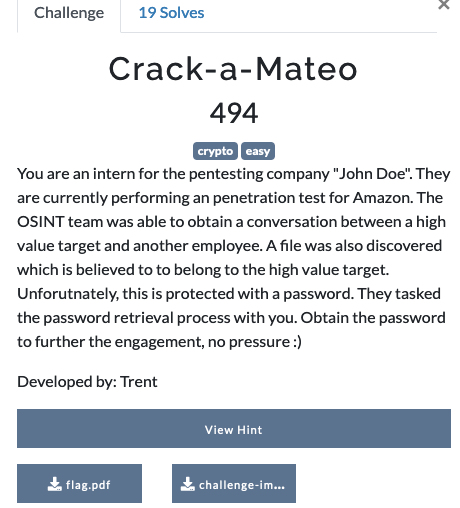 We are given a password-protected PDF file and a screencap of a text conversation.
We are given a password-protected PDF file and a screencap of a text conversation.
 The personal info is used to create a potential password list using a tool called CUPP
The personal info is used to create a potential password list using a tool called CUPP
The known information that can be gathered from the text messages are:
Victim: Mateo, DOB: 10 May 1979
Spouse: Jennifer, DOB: 16 Sep 1979
Daughter: Melia, DOB: 18 Sep 2010 (or could be 2011)
Special keywords: Amazon, Luis Vuitton
Use these parameters:
Add special chars at the end of words? Y
Add some random numbers at the end of words? N
Leet mode? (i.e. leet = 1337) Y
This generates a potential wordlist with 17232 potential passwords. Using john to crack the pdf hash, gives us the password: m3l14!@'#'
% wc mateo.txt
17231 17232 175207 mateo.txt
% john --wordlist=mateo.txt flag.pdf.hash
Using default input encoding: UTF-8
Loaded 1 password hash (PDF [MD5 SHA2 RC4/AES 32/64])
Cost 1 (revision) is 3 for all loaded hashes
Press 'q' or Ctrl-C to abort, almost any other key for status
m3l14!@'#' (flag.pdf)
1g 0:00:00:00 DONE (2024-03-24 20:34) 4.545g/s 49763p/s 49763c/s 49763C/s m3l14!@$..m3l14!@'#'
Use the "--show --format=PDF" options to display all of the cracked passwords reliably
Session completed

mutant-mayhem
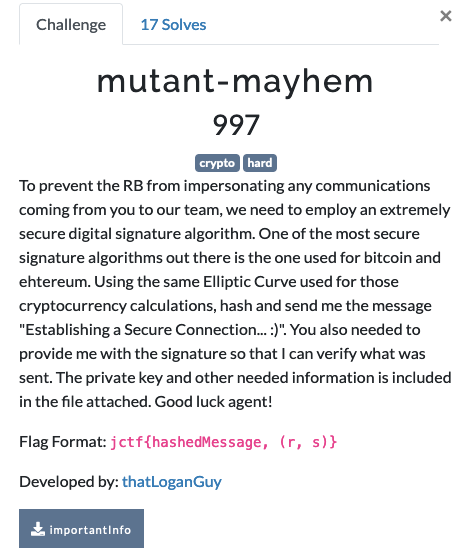
The attachment to the challenge provides us two values
k: 18549227558159405545704959828455330521347940195552729233417641071946733850760
d: 85752879200026332776470151463649568914870763740738869194582948094216537381852
k is the nonce to be used for signing
d is the private key (that must not be shared)
We are asked to sign the message Establishing a Secure Connection... :) and return the hashed message along with the signature (which are two coordinates on the EC). This is an implementation of ECDSA (Elliptic Curve Digital Signature Algorithm). The algorithm is as follows:
- To sign the message \(m\), the server calculates the hash: \(h = SHA1(m) \).
- A cryptographically secure integer \(k\) is picked. In our case, this is provided in the challenge
- A random point on the curve is produced from \(R = k*G\) and an integer \(r = R \cdot x \mod n \) is caluclated.
- Finally we sign \(h\) by calculating \(s = k^{-1}(h + r*d) \mod n\). The signed message \(S(m)\) is the tuple \((r,s)\).
This is the implementation of this algo to derive the flag.
import ecdsa
from hashlib import sha256
from Crypto.Util.number import inverse
k= 18549227558159405545704959828455330521347940195552729233417641071946733850760
d= 85752879200026332776470151463649568914870763740738869194582948094216537381852
m= b'Establishing a Secure Connection... :)'
# SECP256k1 is the Bitcoin elliptic curve
C = ecdsa.SECP256k1
G = C.generator
R = k*G
n = G.order()
r = int(R.x()) % n
H = sha256(m)
h = int(sha256(m).hexdigest(), 16)
s = inverse(k,n)*(h+r*d)%n
print(f"{h=}")
print(f"{int(r)=}")
print(f"{int(s)=}")
print(f"{h}, ({int(r)}, {int(s)})") # Assemble these values, wrap in jctf{} and submit as the flag.
AdveRSAry
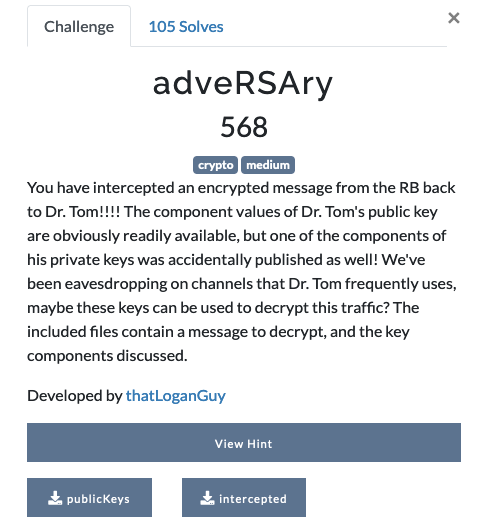
- The
publickeysattachment has the valuesn,eandq, which are the modulus, exponent and one of the private prime factors, respectively. - Since we know one of the prime factors, we can determine the second one, thus defeating the RSA algorithm
- The second attachment
interceptedcontains a bytestream, which is presumed to be the encrypted traffic intercepted on a channel. - This is textbook example of RSA with one of the prime factors given. So it is quite simple to solve it.
from Crypto.Util.number import inverse, long_to_bytes, bytes_to_long
'''
we are given
ct : ciphertext (in bytes)
n : modulus
e : exponent
q : private prime factor of the modulus
'''
ct = ..
n = ..
e = 65537
q = ..
assert n%q == 0
p = n//q
phi = (p-1)*(q-1)
d = inverse(e, phi)
c = bytes_to_long(ct)
m = pow(c, d, n)
print(long_to_bytes(m))
# b' .... jctf{HAHAHA I knew you would intercept this transmission. You may have won this round, but there are many more challenges for me to best you at}'
Hashcraft

We are given a password protected zip file. The challenge description hints at creating rules for hashcat based on the word adminbackup. The challenge hint says OneRuleToRuleThemAll.
- The hint refers to a
hashcatrulebase here - Use the word
adminbackupto generate a wordlist using this ruleset - Run John against the hash, using this wordlist.
- Wrap the password detected in
jctf{}and submit as the flag.
% echo -n "adminbackup" | hashcat -r OneRuleToRuleThemAll.rule --stdout > adminbackup.txt
% zip2john encrypted_backup.zip > zip.hash
% john --wordlist=adminbackup.txt zip.hash
Using default input encoding: UTF-8
Loaded 1 password hash (PKZIP [32/64])
Press 'q' or Ctrl-C to abort, almost any other key for status
1a2d3m4inbackup (encrypted_backup.zip/etc_backup.tar.gz) <====== password here
1g 0:00:00:00 DONE (2024-03-26 23:17) 25.00g/s 1206Kp/s 1206Kc/s 1206KC/s adminbeackup1..adminbackup2
Use the "--show" option to display all of the cracked passwords reliably
Session completed
Resources
- https://github.com/DvorakDwarf/Infinite-Storage-Glitch
- https://github.com/GiacomoPope/giacomopope.github.io/tree/master/redpwn
Challenges
Category Challenge Description *Feedback JerseyCTF IV Feeback *Required Rules for JerseyCTF IV bin/rev MathTest bin/rev PasswordManager bin/rev Postage bin/rev RunningOnPrayers bin/rev StageLeft bin/rev humble-beginnings bin/rev searching-through-vines bin/rev the-heist-1 crypto Attn-Agents crypto Crack-a-Mateo crypto HashCraft crypto adveRSAry crypto corporateEspionage crypto cyber-artifacts crypto its-not-greek-to-me crypto mutant-mayhem forensics All-Along-the-Watchtower forensics digital-footprint forensics groovy forensics insecure-creds forensics living-on-the-edge forensics locked-out forensics netrunner-detected forensics open-notes forensics rescue-mission forensics secret-tunnels forensics sticky-situation forensics substitute-detail-torrent forensics vibrations misc Augmented-&-Fragmented misc Unlocking Amnesia: The Password Puzzle misc cloud-storage-chaos misc data-divergence-discovery misc future-packet misc internal-tensions misc lockbox misc p1ng-p0ng misc surf-n-turf misc the-droid-youre-looking-for misc welcome-hackers misc what-council misc wi-will-wi-will… osint advised-on-a-novel-idea osint beyond-the-packet osint coasting-underground osint cyber-daddy osint dear-john osint thanks-ray osint the-golden-falcon-and-the-rugged-lands osint the-internet-is-forever osint the-only-way-out osint this-is-not-the-flag-you-are-looking-for osint where-is-it web Consent-N-Consent web N0D3BR3ACHER$ web interesting-sites web logging4joy web mmmmm-rbs web require-all-denied web runner-net
